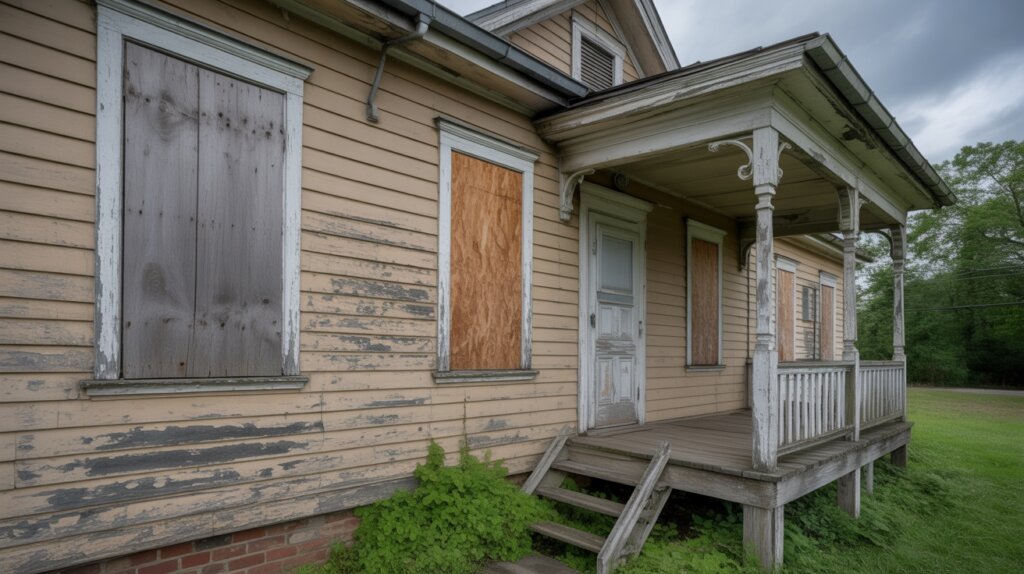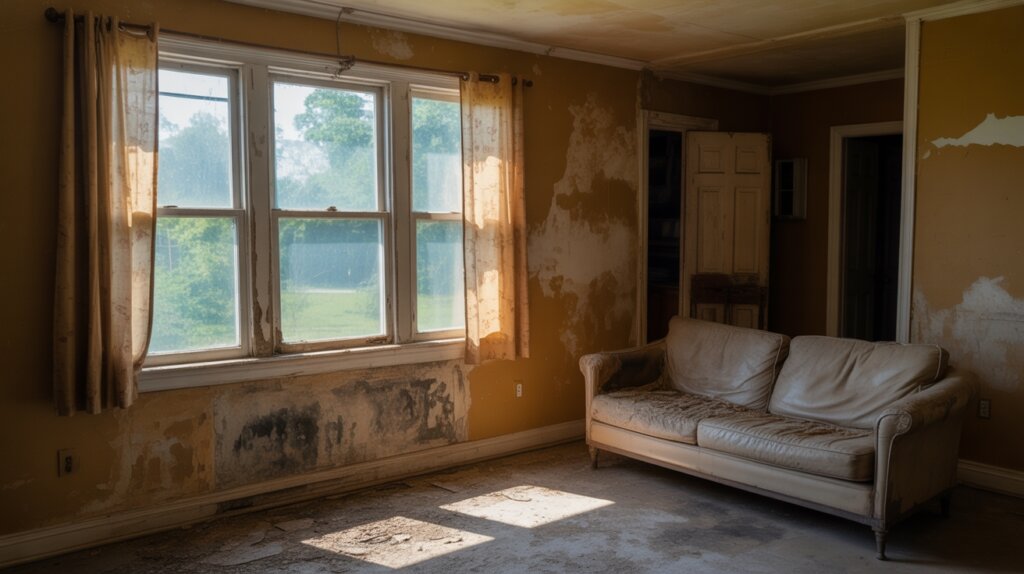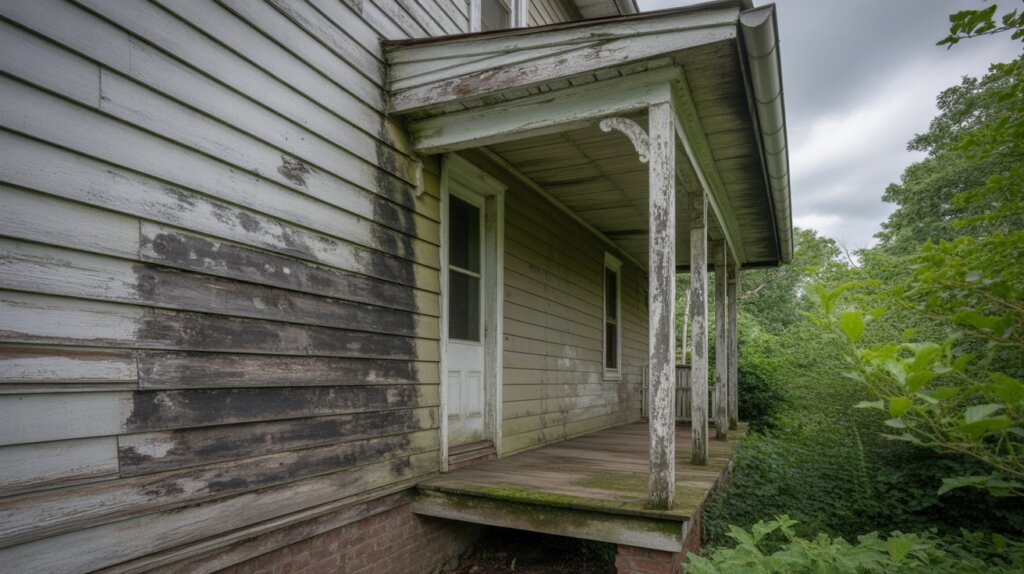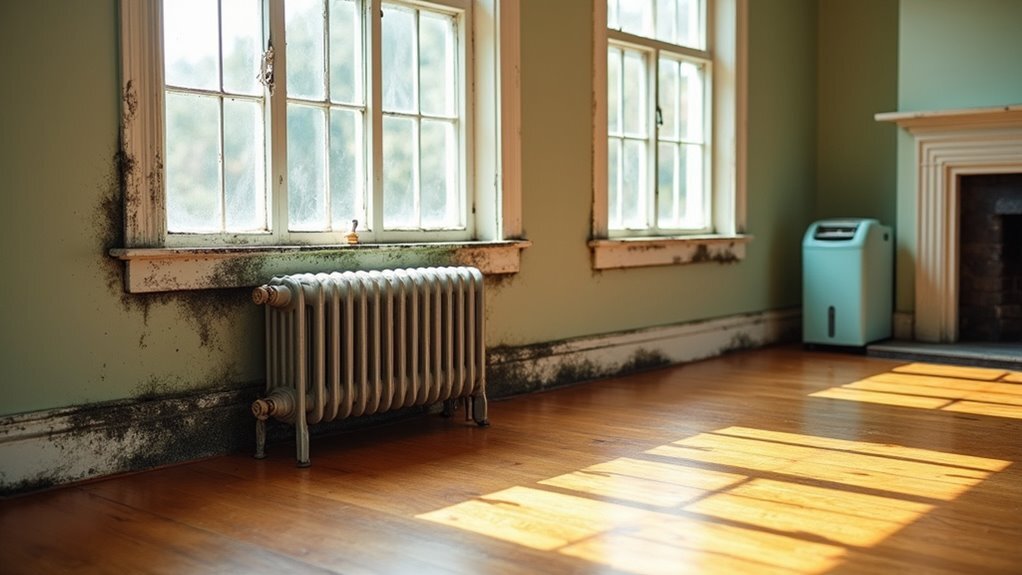Selling a house with mold issues in Kentucky is tough. Mold scares away buyers and can lower your home’s value. Kentucky’s laws also add extra pressure because sellers must follow strict disclosure rules.
These problems can lead to delays or failed sales. Buyers worry about health risks and costly repairs. Sellers fear legal trouble or getting stuck with their property. You can sell a house with mold in Kentucky by following disclosure rules, fixing the problem, and marketing wisely.
This blog will guide you through each step and help you sell your home despite mold issues. You will get practical tips for a smooth sale.
Key Takeaways
- Disclose all known mold issues to buyers using Kentucky’s required Property Condition Disclosure form to comply with state law.
- Consider hiring certified professionals for mold inspection and remediation to improve buyer confidence and legal protection.
- Keep documentation of mold repairs, inspections, and insurance claims to share with potential buyers and avoid legal disputes.
- Decide whether to fix the mold problem or sell the home as-is, factoring in repair costs and potential buyer types like investors.
- Market the property honestly, highlighting repairs and improvements, and be transparent about mold history during negotiations.
Understanding Mold: Causes and Common Types in Kentucky Homes

Mold grows in Kentucky homes because of high humidity and moisture. Leaky roofs, poor ventilation, and plumbing issues cause mold growth. Homeowners must control moisture to prevent mold. Proper ventilation and moisture control are essential to reduce mold spores and prevent health issues. Regular mold assessment helps catch issues early before they become severe. Additionally, understanding the different types of mold prevalent in Kentucky can aid in effective identification and treatment.
Recognizing the Signs and Symptoms of Mold Infestation
Mold infestation can be identified by several clear signs in your home. Mold often hides in places you do not check often. If you notice these signs, you should act quickly.
Musty smells, stains, and discoloration on walls or ceilings often point to mold. Warped wood, peeling paint, or unexplained stains are also warning signs. These usually appear in damp areas like basements and bathrooms.
The table below shows common mold indicators and where to find them:
| Indicator | Typical Location | Associated Moisture Source |
|---|---|---|
| Musty Odor | Basements, Closets | Poor ventilation, leaks |
| Discoloration | Ceilings, Drywall | Roof or plumbing leaks |
| Visible Growth | Tile, Woodwork | High humidity, flooding |
| Peeling Paint | Windowsills, Walls | Condensation, seepage |
If you spot any of these signs, check for moisture problems. Early detection makes mold removal easier. It also helps prevent more damage to your home. Recognizing structural issues and moisture sources early is crucial for effective remediation. Being aware of potential soil problems, such as poor drainage that traps moisture, can help prevent mold growth and further damage to your house.
Health Risks Associated With Mold Exposure

You need to understand that mold exposure can trigger respiratory problems, allergic reactions, and persistent symptoms like coughing or wheezing. Individuals with asthma or allergies are particularly vulnerable, but long-term exposure may also lead to more serious health complications.
Prioritize a thorough assessment to protect both your household and potential buyers from these risks. Recognizing mold growth issues early can prevent costly health and property damages. Additionally, understanding how moisture control influences mold development can help in implementing effective prevention strategies.
Respiratory Problems From Mold
Mold in a home can cause breathing problems. People with asthma, allergies, or weak immune systems are most at risk. Mold spores in the air can lower indoor air quality.
Breathing in these spores may cause coughing, wheezing, or trouble breathing. Some people could develop bronchitis or lung infections if exposed for a long time. If you notice these symptoms, seek medical advice.
If you find mold, use HEPA filters to clean the air. Keep humidity below 60% to slow mold growth. Always contact certified mold experts for proper removal.
Fixing mold problems protects your health and your home’s value. Buyers are more interested in safe, clean homes in Kentucky. Taking action can improve your chances in the real estate market.
Allergic Reactions and Symptoms
Mold can cause allergic reactions in people who are sensitive. Common symptoms include sneezing, runny nose, itchy eyes, skin rashes, or stuffy nose. Symptoms often get worse indoors or after cleaning areas with mold.
Children, older adults, and people with allergies or asthma are at higher risk. If you notice these symptoms and they do not go away, you should see a doctor. People with severe allergies may need medical advice right away.
If you are selling a home in Kentucky with mold, you must report any allergic reactions. You should tell buyers about the problem and share all information honestly. Cleaning and fixing mold quickly can help protect everyone’s health.
Long-Term Health Concerns
Long-term mold exposure can cause serious health problems. People may develop breathing issues, worse asthma, or more frequent infections. Some molds release toxins that could harm the brain or raise cancer risk.
Homeowners should act quickly to prevent mold growth. If you control moisture, fix leaks, and use good ventilation, mold is less likely to grow. Regular checks and fast repairs help protect both health and property value.
If mold problems are not fixed, buyers may lose interest in your home. You could also face legal trouble if you hide mold issues. If you plan to sell, always fix mold problems and tell buyers about them.
Kentucky Laws and Regulations Regarding Mold Disclosure

You must comply with Kentucky’s mandatory disclosure requirements by informing buyers of any known mold issues in your property. Failing to disclose can expose you to legal consequences, including lawsuits and financial penalties. Protect yourself by documenting all known mold conditions and providing accurate disclosures during the sale process.
Additionally, understanding title considerations and ensuring clear legal ownership can prevent future disputes related to mold disclosures. Recognizing the importance of disclosure obligations helps ensure a compliant and transparent transaction.
Mandatory Disclosure Requirements
Kentucky law says you must tell buyers about mold problems when selling your house. The Property Condition Disclosure form is required. You must report any known mold issues, big or small.
If your home belongs to a homeowners association, you must also share any group actions for mold or water damage. You should include details about past inspections, repairs, or mold clean-up. Always mention if you have filed a mold insurance claim.
Keep records of any work done or claims made. These documents help prevent future problems. If you do not know what to disclose, ask a real estate agent or lawyer.
Legal Consequences for Non-Compliance
Failing to disclose mold problems when selling a house in Kentucky can lead to legal and financial trouble. Kentucky law says you must tell buyers about any known mold issues. If you do not follow this rule, you risk lawsuits and penalties.
A buyer could sue you for damages if they find hidden mold after the sale. Courts may even cancel the sale and make you take the house back. State authorities can fine you for not obeying disclosure laws.
Your reputation as a seller could suffer if you hide mold problems. Future real estate deals may become harder for you. If you want to avoid these risks, always share known issues with buyers.
If you fix mold problems and inform buyers, you lower your chance of legal trouble. Full disclosure protects you and helps the sale go smoothly. Always check Kentucky’s rules and follow them closely.
Your Legal Responsibilities as a Seller
If you sell a home in Kentucky, you must follow state disclosure laws. Sellers must tell buyers about any known mold in the home. This is required by law and helps avoid legal problems.
You must fill out a Seller’s Disclosure of Property Condition form. This form should list any mold issues you know about. If you hide mold problems, you could face lawsuits or lose the sale.
Mold can lower your home’s value. You should keep records of any mold repairs or cleanup you have done. Buyers and their agents may ask to see proof of this work.
Never try to cover up mold before showings or inspections. If you do, the buyer may cancel the deal or take legal action. Addressing title issues and ensuring a clear legal ownership can further protect you from possible legal disputes. If you have questions, talk to your real estate agent or a lawyer.
Assessing the Extent of Mold Damage
Assessing the extent of mold damage means checking how much mold is in your home. You need to know this before selling. Accurate assessment protects your investment and fulfills legal requirements.
A home inspection should focus on areas that get wet easily. Mold can grow in hidden spots, not just where you can see it. If you suspect hidden mold, consider doing mold testing. Proper documentation is important if you find mold. If you leave issues unchecked, it could affect the sale and buyer confidence.
A careful assessment helps you find and solve real problems. Property disclosures are essential to maintain transparency and comply with legal requirements during the sale process. Additionally, understanding local regulations regarding mold disclosure requirements ensures you meet all legal obligations during the sale.
Hiring a Professional Mold Inspector
Hiring a professional mold inspector gives you a clear picture of mold problems in your Kentucky home. A certified inspector finds mold that you may not see. This step is important before making improvements or selling your house. Properly assessing mold issues can also help you sell your house fast in Kentucky by addressing problems upfront.
Inspectors use special tools, such as moisture meters and air testers, to spot hidden mold. If you want an accurate report, always check the inspector’s credentials. Ask for a written report so you can share it with buyers. Conducting a thorough mold assessment can also assist in compliance with disclosure laws, ensuring transparency during the sale process.
If you fix mold problems early, you make your home more attractive to buyers. This also helps you follow Kentucky’s disclosure rules. Taking action protects both your investment and the health of future residents.
Mold Remediation Options: DIY vs. Professional Services
When choosing between DIY and professional mold remediation, you’ll need to weigh upfront costs against long-term effectiveness. Consider whether your budget allows for certified specialists, who ensure thorough removal and minimize recurrence. Don’t overlook health and safety risks—improper handling can worsen both the mold problem and your liability when selling.
Additionally, addressing underlying issues such as poor ventilation or moisture intrusion is essential to prevent future mold growth.Proper market assessment is crucial to ensure the mold issue doesn’t negatively impact your home’s value or sale prospects in Kentucky.
Cost Comparison and Budget
Understanding the costs of mold removal in Kentucky helps you decide on DIY or hiring professionals. Costs depend on the size of the problem and needed work.
DIY supplies like gloves, cleaners, and trash bags can become expensive. Professional mold removal costs between $500 and $6,000 based on area and severity. Third-party mold inspections usually cost $200 to $600.
Repairs after cleaning and steps to stop moisture may add extra costs. If you budget carefully, you can avoid surprises. Wise spending can help you get the best price when selling your property.
Effectiveness and Long-Term Results
DIY mold removal often misses hidden mold and does not stop future growth. Surface cleaning may leave spores behind in walls or floors. If you want lasting results, professional mold removal is the best choice.
Certified technicians use special tools to find and remove all mold. Their methods help stop mold from coming back. Professional treatment also gets rid of stains and musty smells.
If you plan to sell your home, expert mold cleanup is a smart investment. Buyers are more confident when they know mold was removed by professionals. This can help your home sell faster and for a better price in Kentucky.
Health and Safety Concerns
Mold can cause health and safety problems in your home. Mold spores may trigger allergies, breathing issues, or worsen some health conditions. People with weak immune systems are especially at risk.
DIY mold removal may not include proper containment or protective gear. Professionals use special equipment and follow strict safety rules. If you try to remove mold yourself, you could accidentally spread it.
Kentucky may require special training or certification for mold removal. If you are unsure, you should ask a professional for advice. Always put safety first before starting any mold cleanup.
Estimating the Cost of Mold Removal
Mold removal costs in Kentucky depend on several key factors. Companies look at the size of the affected area and the type of mold. If more materials are damaged or hard to reach, the price will be higher. Additionally, addressing underlying causes such as unpaid property taxes and ensuring proper property maintenance can help prevent mold growth and reduce removal costs.
Professionals usually charge more for large or complex jobs. If drywall or flooring needs replacement, labor and material costs rise. Some projects can cost from $500 to $6,000 or even more. You should get at least two itemized quotes from certified mold specialists. Make sure the quotes cover containment, removal, disposal, and testing. If you do this, you will be better prepared for expenses before selling your home.
Should You Fix the Mold Problem or Sell As-Is?
You need to weigh the repair costs against your expected sale price before deciding whether to remediate mold or sell as-is. Kentucky law requires you to disclose known mold issues honestly to potential buyers. Assess your budget and timeline to determine the most strategic approach for your situation.
Weighing Repair Costs
Repair costs are a key factor when deciding to fix mold or sell your house as-is. You should get estimates for repairs and check if insurance will help pay. If repairs cost more than added value, selling as-is may make sense.
Professional mold removal can be expensive. Insurance might cover some costs, but not always. You should compare costs to the home’s expected value after repairs.
Time needed for repairs increases holding costs like mortgage and utilities. Mold prevention steps and warranties may also cost extra. If these costs are high, you might want to sell without repairs.
Review all financial factors before choosing. If costs and time are too great, selling as-is could be best. Each situation is different, so consider your needs and budget.
Disclosing Mold Honestly
Kentucky law requires you to disclose any known mold problems when selling your house. If you hide mold issues, you could face legal trouble. Always tell buyers about any mold and what you have done to fix it.
You should write down the size of the mold problem and the repairs made. If you sell your house as-is, state this clearly in your paperwork. Honest disclosure helps buyers understand what they are buying.
If mold is present, you can improve your home’s look to attract buyers. Clean your house and keep the yard neat. A well-staged home can help offset concerns about repairs.
Being open about defects builds trust with buyers. This approach protects you during the sale process. If you are honest, buyers can make informed decisions.
Attracting Buyers for a Property With Mold Issues
Properties with mold problems can still attract buyers if you use the right approach. Addressing concerns directly and showing what you have done builds trust. Being open about the issue helps buyers feel more confident.
You should share any mold inspection or repair reports you have. If you have improved ventilation, make this clear to buyers. Good lighting and fresh air can make the home feel healthier.
Investment buyers may see mold as a chance to get a better deal. If targeting these buyers, highlight renovation potential in your ads. You could also offer to help with closing costs if buyers are worried about repairs.
Professional photos and honest descriptions will make your property stand out online. Clear communication helps reduce buyer hesitation. Always provide accurate details so buyers know what to expect.
Selling to Cash Buyers and Real Estate Investors
Cash buyers and real estate investors are good options if you want to sell a house with mold issues. They often buy homes “as is,” so you do not need to pay for mold repairs. If you want to avoid extra costs, these buyers can help you sell quickly.
Investors know the Kentucky market and can see the potential in your property. They look at the neighborhood and estimate the resale value after repairs. Quick closings can help you save on holding costs and prevent more damage.
If you market your home, focus on the strength of the neighborhood. A property in a good area can still appeal to investors, even if it needs work. Selling to buyers who handle distressed homes may help you close the sale without extra upgrades.
Negotiating Offers and Handling Buyer Concerns
When talking about offers for a house with mold, address buyer concerns honestly and clearly. Kentucky buyers want full disclosure about mold. You should explain the situation right away.
Be upfront with buyers about mold issues—full disclosure builds trust and sets the stage for honest negotiations in Kentucky.
If you have finished mold repairs, show proof to buyers. Inspection reports can help build trust and answer questions. Consider sharing quotes for any needed repairs.
Home staging can highlight parts of the house not affected by mold. This helps buyers see the home’s potential. You can also target buyers who are fine with as-is homes.
Be ready to explain your price using inspection results and repair costs. If buyers have questions, answer them quickly. Keep communication open and flexible during all negotiations.
Tips for a Smooth and Honest Transaction
A smooth and honest transaction needs clear communication and thorough documentation. Sellers should share all inspection reports, repair records, and maintenance plans in writing. Digital signatures help speed up paperwork and keep records safe.
Home staging should make the house look clean and welcoming. Sellers can highlight the home’s best features and use simple décor to reduce the mold issue’s impact. Clean and declutter each room before showings.
Local benefits, like schools or parks, help buyers see the home’s value. Sellers should talk about these features during showings if the home has challenges. Good neighborhood features can offset some concerns.
Sellers must answer questions quickly and keep in touch with the buyer’s agent. If possible, they should keep all receipts for mold repairs. Honest and organized sellers build trust and reduce legal risks after the sale.
Conclusion
If you need to sell a house with mold issues in Kentucky, honesty is essential. If you disclose all problems and keep detailed records, you can avoid legal trouble. If you work with professionals, you increase buyer confidence and simplify the process.
If you want to sell quickly, you should consider cash buyers. If you choose this option, you can often skip repairs and close faster. If you have questions, you can always ask for advice from real estate experts.
If you are ready to sell, we at OC Real Estate can help. If you contact us, we will buy your house for cash. If you want a fast and simple sale, reach out to OC Real Estate today.

